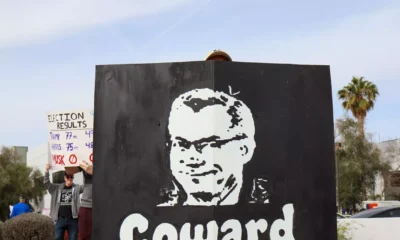15-week ban
Pro-Choice Activists and Democrats Target Abortion Laws – But Will They Succeed?

Abortion rights advocates in Arizona are preparing for a challenging legislative session where they aim to repeal existing state laws that conflict with the newly established constitutional right to abortion. However, with Republican majorities in both legislative chambers, supporters recognize the uphill battle ahead.
Efforts to challenge Arizona’s 15-week abortion ban are already underway through a lawsuit. Advocates of Proposition 139 express concerns that existing provisions still pose significant barriers to abortion care, setting the stage for renewed legislative confrontations this session and in future ones.
“I definitely think it’ll be a challenge,” said Erika Mach, chief external affairs officer of Planned Parenthood Advocates of Arizona. “We’re prepared to make strides in repealing the 40-plus restrictions currently in place. While litigation is ongoing, we aim to collaborate with our partners, elected officials, and the Governor’s Office to address these restrictions promptly.”
Following the passage of Proposition 139, abortion rights groups prepared to eliminate conflicting state laws. They initiated legal action against the 15-week ban shortly after the state canvass, filing a lawsuit with support from the ACLU and the Center for Reproductive Rights.
Attorney General Kris Mayes has joined the lawsuit and declared the 15-week law unconstitutional, agreeing not to enforce it until the litigation concludes. However, no entity has yet stepped forward to defend the ban.
As the court challenge progresses, advocates are also focusing on legislative opportunities to repeal conflicting laws. Nevertheless, the prevailing conservative majority in the Legislature could hinder immediate reform efforts.
Darrell Hill, policy director for the ACLU of Arizona, remarked on the potential for new bills aimed at aligning Arizona law with the state Constitution. Yet, he expressed skepticism about their viability, foreseeing resistance from conservative lawmakers.
While Hill indicated that the ACLU lacks a specific priority list, he mentioned any law diminishing timely and affordable access to abortion care could violate the state Constitution.
Mach highlighted specific statutes that need attention, including one mandating annual reporting on abortions, which Governor Katie Hobbs has criticized as “invasive.”
She also pointed out restrictions on telehealth prescriptions for abortion pills and the 24-hour waiting period as additional burdens to accessing care. The broader objective is to dismantle legal obstacles that hinder patients’ access to necessary healthcare.
Both advocates recognize the substantial challenges ahead given the Republican-controlled Legislature. There is concern that anti-abortion groups may introduce legislation to limit the impact of Proposition 139.
Cathi Herrod, president of the Center for Arizona Policy, previously stated the organization would actively seek to curtail the implications of Proposition 139. However, she recently noted no specific plans have been announced for the upcoming session, with further steps still to be determined.


















